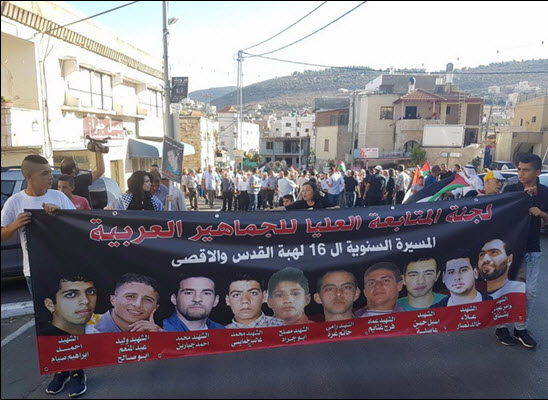Thousands participated on Saturday, October 1, in a march to mark the 16th anniversary of the October 2000 protests in which 13 young Arab-Palestinians were shot and killed by Israel Police. On Saturday morning, wreaths were laid on the graves of those killed, followed by a main procession in the northern city of Sakhnin. The event was attended by Joint List Knesset members and activists from other political movements in the Arab community, among them members of Hadash and the Communist Party of Israel. Some marchers held aloft Palestinian flags and photographs of the dead.

Marchers display banner on Saturday, October 1, during the march in Sakhnin to commemorate the 16th anniversary of the October 2000 protests in which 13 young Arab-Palestinians were shot and killed by Israel Police. (Photo: Al-Ittihad)
Sakhnin Mayor Mazen Ganaim, Higher Arab Monitoring Committee chairman and former Hadash MK Mohammad Barakeh, and Abed Al-Manam Abu Saleh, who represented the families of the deceased, spoke at the rally that followed the march. The three said that the October demonstrations were an expression of rage directed at the Israeli policy of discrimination, racism, occupation and attacks on al-Aqsa Mosque, a policy, they said, that continues to this day.
According to al-Ittihad, the daily newspaper of the Communist Party of Israel, during the rally Barakeh said that Israel government had not learned the lessons of the October protests and instead of embracing the Arab minority, was trying to tear it apart and destroy its political leadership. “They will not break our spirit. We are excluded from all events, and all of a sudden it’s important for Israel if we participate in the funeral of Shimon Peres? Suddenly we’re missed?” he asked rhetorically. “This is not our priority — we have problems with land, house demolitions, and other matters,” Barakeh added.
One of the immediate causes leading to the October 2000 protests was a visit by Ariel Sharon, then head of the far-right opposition, to the al-Aqsa Mosque/Temple Mount on September 28, 2000. Clashes erupted in Jerusalem as a result of the visit, resulting in casualties among both police and Palestinians. At the same time, demonstrations took place in Arab towns in Israel, during which rocks were thrown and roads were blocked. The Higher Arab Monitoring Committee decided to declare a general strike throughout the Arab community in Israel. Protests then took place between October 1 and October 8 in Arab towns and cities across Israel. In the violent clashes that broke out between demonstrators and police, 12 Arab-Palestinian citizens of Israel and one Palestinian from the occupied territories were killed, some as a result of live fire and others from rubber-tipped bullets.


